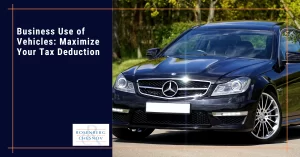Introduction: 
For many small business owners, using a car for business purposes is a common practice. However, understanding the tax implications and maximizing savings related to business car use is essential. In this blog post, we’ll explore key strategies to help you maximize tax savings when using your car for business, ensuring you make the most of available deductions.
- Documenting Business Use:
- Maintain detailed records of your car’s business use, including mileage, dates, and purposes of each trip. This documentation is crucial for accurately claiming deductions.
- Choosing the Right Deduction Method:
- Evaluate the two primary deduction methods: the standard mileage rate or the actual expense method. Compare both to determine which provides the most significant tax savings for your specific situation.
- Standard Mileage Rate:
- Understand the standard mileage rate set by the IRS. For 2023, the rate is [current IRS standard mileage rate], allowing you to deduct a specific amount per business mile driven.
- Actual Expense Method:
- Consider using the actual expense method if you have significant vehicle-related expenses. This includes costs like fuel, maintenance, insurance, and depreciation. Keep meticulous records to substantiate your claims.
- Vehicle Depreciation:
- Leverage vehicle depreciation as an essential component of the actual expense method. Understand the applicable rules and recovery periods for depreciating your business vehicle.
- Section 179 Deduction:
- Explore the Section 179 deduction for immediate expensing of qualifying business assets, including vehicles. This can provide a substantial upfront deduction for the cost of the vehicle.
- Separate Personal and Business Use:
- Maintain a clear distinction between personal and business use of your car. Deductions are generally not allowed for personal commuting, but they are eligible for business-related travel.
- Record Parking and Toll Expenses:
- Include parking and toll expenses related to business trips in your documentation. These costs are deductible and contribute to maximizing your overall tax savings.
- Leasing vs. Owning Considerations:
- Evaluate the tax implications of leasing versus owning a business vehicle. Each option has unique tax considerations, and the choice can impact your overall tax strategy.
- Regularly Review Tax Laws:
- Stay informed about changes in tax laws related to business car use. Regular reviews ensure you are taking advantage of any new deductions or credits.
Consult with Ivy Tax & Business Inc:
Navigating the complexities of tax savings for business car use requires a tailored approach. Ivy Tax & Business Inc can provide personalized guidance, helping you optimize your tax strategy while remaining compliant with tax laws.
Conclusion:
By implementing these strategies and staying informed about tax regulations, you can maximize tax savings when using your car for business. Contact Ivy Tax & Business Inc for expert advice tailored to your specific business car use scenario.
This article is intended solely for informational purposes and does not constitute legal, financial, or professional advice. Readers are advised to consult professionals in the relevant fields before taking any action to obtain personalized advice.


